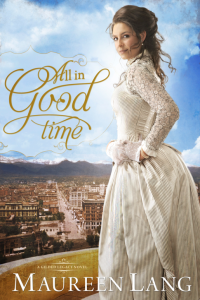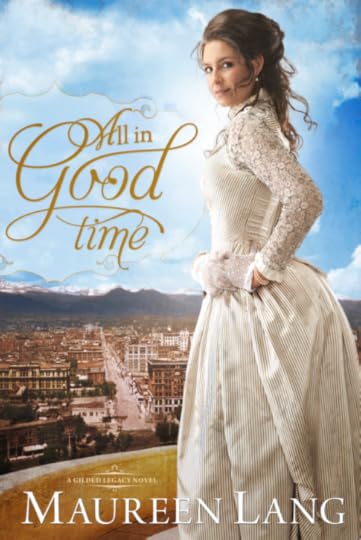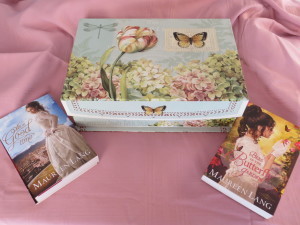Maureen Lang's Blog, page 8
April 22, 2013
It was taught . . . but was it caught?
What is faith? In this Year of Faith, as Catholics we are asked to …
My sister visited the other day and we were talking about our family. (What else do you do when not all of your siblings are present? We talk about those not there, of course.) We were lamenting that not all of our nieces and nephews have followed in the faith they were taught, despite being raised by parents of faith.
We talk about those not there, of course.) We were lamenting that not all of our nieces and nephews have followed in the faith they were taught, despite being raised by parents of faith.When most of our family was together recently, my sister asked a few who aren’t known to go to church why so many young people seem to have no desire to attend church. She received answers like: “I know what I believe, I don’t have to go to an organization like church to sort that out.” Or: “I work all week and want my days off to do what I want, start to finish.”
Going to church may not be the best measure of true faith, but the fact is there must be some evidence of faith for it to appear important enough in someone’s life to be true.
Which led my husband to recall something he’d heard when a former president came to speak at his school. It isn’t often that I quote President Clinton, but when he said there had to be more to education than just to be taught, that it had to be caught, that phrase stuck with my husband because it’s so true. If there isn’t any interest, involvement or effort on the student’s part, a teacher can be wasting his or her time trying to teach.
That’s sadly true with what we try teaching our own kids. We can raise our children in a faith-filled home, pray for them and teach them the truths of the Bible. But their faith must become their own. To offer a cliche: God has no grandchildren.
So what’s the answer? As we sat talking, my family didn’t come up with one. We’re already committed to prayer, but after our talk we determined to make more effort to lovingly represent our faith so those in the next generation won’t trip over us if they look for God on their own.
That’s my prayer this week: to do more than just not get in the way of God’s love, but to show His love to others, especially those in my family. After the week this world had last week, between the Boston bombing and its aftermath, the Texas explosion, the earthquakes in China and the floods right here in the Midwest, even a smile might go a long way.
April 15, 2013
And the winner is . . .
 I’m happy to report the winner of my giveaway basket is Tammy H.! I’ve been in touch with Tammy, and the giveaway box will soon be on its way.
I’m happy to report the winner of my giveaway basket is Tammy H.! I’ve been in touch with Tammy, and the giveaway box will soon be on its way.
Congratulations, Tammy!
It’s been a fun week checking in on the progress of the contest—so much that I’m sure I’ll be doing another soon. I’ve always enjoyed shopping for gifts, and collecting items for this basket was a bit like doing that. So I’ll keep that up!
I was glad to read in the comments that many people enjoy slice of life posts. The ones I’ve written usually come from discussions with my husband, during what we call our “debriefing” sessions. We’ve been doing this every day for more than a decade, mainly because we’re blessed to be similar in many ways. Oh, he’s a science guy and I’m a writer, which means what we do have in common is displayed in different ways. But we’re both creative, and both generally curious people. When we come across something interesting, we keep it in mind to talk about with each other. It’s amazing how much we enjoy discussing something that, on our own, we probably wouldn’t have thought about without the other one of us bringing it up.
Just yesterday I was recounting how I’d seen a portion of a debate on the television and that the format tallied the opinion of the audience coming in and then, once the debate ended, if any minds were changed on that particular topic. It’s difficult to change your thinking on things, particularly if you’ve held certain views for some time. Even when presented compelling arguments, there are some beliefs that are hard or even impossible to let go.
When I mentioned this to my science-teacher husband, he just laughed and said every school year in his class shares that format. He teaches Physics, and tells the students that the way they understand something may not be the way things really are.
Huh?
Physics must convince the students how things really work, not necessarily what they see. Case in point: if you slide a hockey puck across the floor, eventually it stops. Why? Because it runs out of energy from the push? Nope. The kids are surprised to learn that without other forces on this hockey puck, such as friction and air resistance, once that hockey puck was set in motion it would have continued going . . . forever.
So you wonder what would happen if you slapshotted that puck off a table? It would hit the ground and once again come to a stop due to those previously mentioned forces. This is where Einstein and his thought experiment ideas prove useful, something Isaac Newton understood. Newton said if you hit that hockey puck fast enough and could do it off the ground and outside our atmosphere, it would still try to fall to earth—but if the hockey puck were given just the right speed, the path of the puck would trace out a circle and match the earth’s shape. That’s how satellites work, by the way. If you shoot that puck this way, you would have humanity’s first hockey puck in orbit (along with thousands and thousands of other orbiting debris).
All I did was mention a bit of a debate I watched, and was reminded that sometimes it’s hard to change your mind, even if what you learned was incorrect. Relearning something might be harder than learning something for the first time!
Thanks again to everyone who participated in my contest this time around, and I hope you’ll check back when I do this again!
April 7, 2013
Contest!
I’m celebrating the release of my new book, All In Good Time, with a new contest!
Whenever I come across a little item that reminds me of the book I’m writing, I add it to a collection for a giveaway. The result may be fun to win, but it’s every bit as much fun to give the collection away! Here is a fuller picture of what my new giveaway items looks like:
And here’s a list of what’s inside, since it was hard to get it all in the photo:
My two Gilded Age Books:
All In Good Time
Bees In The Butterfly Garden
Garden tote bag
Butterfly Meadow Mug, by Lenox
with packet of Adagio loose tea designed by Maureen Lang
Replica vintage items:
Drawstring pouch (perfect for my Gilded Age heroine!)
(2) Necklace watches: butterfly and banker’s watch (one that would have looked just right on my heroine, Dessa Caldwell, and the other reminded me of something my hero might have)
Ring case
Make-up Pouch
Decorative tear bottle*
Butterfly necklace
Earrings (pierced)
Assorted paper goods:
Sticky Notes
Flower Garden Notecards
Magnetic List Pad
80-sheet journal
Personal pack of decorative tissues
All packed in a Decorative Box
Retail Value: over $100.00
Here’s a picture of the decorative box everything’s tucked inside:
*What’s a tear bottle, you ask? This is my favorite gift to give, and I include with it this note:
This little bottle was manufactured as a perfume bottle, and can be used as such . . . but that isn’t my intention for you. Not long ago I was reminded of the verse in Psalms about God keeping track of our tears by putting them in a bottle. Envisioning that, I realized our tears must be precious to Him, precious enough to be stored like expensive perfumes or spices. So I bought myself a pretty perfume bottle that sits on my desk to remind me that God must have a purpose in our tears. I hope this “tear bottle” for you will be a reminder of God’s love, while I pray that a rarity of your tears (except from laughter) is why they’re so precious.
Winners limited to continental USA. Thank you.
March 31, 2013
April Fool’s Day!

Image compliments of Bing Free Images
Today is April 1st—an international day for playing pranks that actually dates back many centuries. In the 16th century the Gregorian calendar was changed to reflect the New Year to start on January 1st rather than April 1st. News traveled slow in those days, as you might imagine. Those who hadn’t heard and still celebrated on April 1st were laughed at and called April Fools. Thus began a tradition that’s lasted all these years . . .
I don’t know about you, but there aren’t many pranks I’d welcome. Good humor does go a long way, though, and it’s only the prideful who can’t take a joke. Still, it depends on the spirit of the joke if it really deserves a laugh or not.
I only ever played one practical joke on anyone, and that was to a very good friend of mine. (Hey, who else could you trust than your very best friend?) It was her birthday, and I went to a carpet store for a few scraps of carpet padding. I cut them into neat round circles to match an 8″ cake pan size, piled them high to resemble a cake, then carefully stuck them together and frosted the whole thing. It was probably one of the prettiest cakes I’d ever made. (I’m more of a cookie connoisseur myself.) A group of us got together to surprise her for her birthday, but when she tried cutting into her lovely cake . . . well, needless to say she wasn’t sure whether to be embarrassed over a dull knife or my poor baking skills. We finally put her out of her sawing misery and told her the cake wouldn’t be cut, at least not with a cake knife.
We all laughed but she was already in good spirits because she was being celebrated, secure in our affection. Now that’s my kind of prank!
So . . . if anyone plays a prank on you today, I hope it’ll be put forth in the same positive spirit.
And now here’s something that isn’t a prank! Today only, 4/1/13, my brand new book, All In Good Time, is being offered by Tyndale House as a free e-book download. All you need do to take advantage of the offer is to act quickly! The free price ends today, Monday. But if by some chance you miss today’s deal, Tyndale will be offering special pricing of 2.99 on Tuesday and Wednesday, 4/2 and 4/3, then 4.99 on Thursday, Friday and Saturday (4/4, 4/5 and 4/6). Regular pricing of around $9.00 begins next Sunday.
Happy April Fool’s Day, be safe and positive, and Happy Reading!
 Links to buy All In Good Time:
Links to buy All In Good Time:
(Special pricing is in regard to e-books only.)
PS I’m visiting my friend Lyn Cote’s blog today, where I talk a little about some of the research I did for All In Good Time. Click here to visit with me there!
March 25, 2013
Easter’s Coming!

Image from Bing Free Images and
http://easterwallpaper.blogspot.com/2...
This year winter is still gripping the Midwest like it’ll never let go, so it’s hard to feel like Easter is nearly here. Of course, Easter is arriving a little early, but still—March is supposed to be one of those “slushy” months, with at least a few transitional days as a promise of what’s just around the corner.
Not so this year. Cold, snow, and wind, all of which feels much like February.
Perhaps that’s why this year we can concentrate more on the spiritual side of this, the holiest of holidays. I’ve been watching the History channel’s presentation of The Bible, which has also been a nice supplement to the season. Even with its various skips and a few flaws in interpretation, it’s been wonderful to see the series received by such a wide audience.
Last night I watched the old movie The Robe. I can’t imagine Hollywood making such a pro-faith movie these days, but back when this released most of our country’s population was at least affiliated with one Christian church or another, even if they didn’t regularly attend. Times most definitely have changed.
Even to non-believers, Easter is a holiday of renewal, mainly because it comes in the spring—the season for renewal. For me, it’s a time to revisit all of the reasons I believe what I do, and that starts with why I accept the Bible as the word of God. My husband and I have discussed this over the years and here, briefly, is why we believe in the Bible’s authenticity:
The history as revealed in the Bible is supported by many outside sources, such as Josephus and Pliny the Younger and many others. (Just search “historical support for the Bible”)
The prophecy in the Bible. Before the discovery of the Dead Sea Scrolls in 1947, many skeptics said the portions of the Bible that referred to prophecy were written after many events took place. The Dead Sea manuscripts are dated from approximately 200 BC to 69 AD, predating many of the manuscripts skeptics have tried denouncing.
The science of the Bible. The more science uncovers about the incredible design of our universe, the miracle of creation, the more science proves the Bible is true. It even revealed the expansion of the universe, discovered in the last century, by talking about the “stretching out of the heavens” in such places as Isaiah, Job, Psalms and Jeremiah. There is a sad divide within the Christian community as to the age of the Universe, and while it’s true the Bible is mostly concerned with “why” we’re here rather than “how we got here,” such places as Reasons to Believe does an excellent job of uncovering all the ways science and the Bible do not contradict.
The philosophy in the Bible understands the heart of man in a timeless fashion, one that stands today like no other document. Because God created us, His book understands us.
Personal experience as described in the Bible is still happening today, with the Holy Spirit speaking to us in ways that support the consistency of God’s character.
So there you have it: my Easter refresher course of why I believe what I believe. How about you? Why not take a moment to reacquaint yourself with what you truly believe . . . and why?
March 18, 2013
All In Good Time Available Now!
 Do you know what it feels like to find the next piece in a puzzle, to figure out a mystery moments before it’s revealed, to anticipate someone’s response just before they fulfill your expectation? That’s what writing All In Good Time felt like. I don’t do a lot of plotting ahead of time, although I do have a general picture of the characters and the direction toward the end. The journey to that end is somewhat a mystery along the way, which is why I enjoy writing as much as I do. I’m like the very first reader of the story.
Do you know what it feels like to find the next piece in a puzzle, to figure out a mystery moments before it’s revealed, to anticipate someone’s response just before they fulfill your expectation? That’s what writing All In Good Time felt like. I don’t do a lot of plotting ahead of time, although I do have a general picture of the characters and the direction toward the end. The journey to that end is somewhat a mystery along the way, which is why I enjoy writing as much as I do. I’m like the very first reader of the story.
When I started writing All In Good Time, I knew my hero’s backstory and little else. I’d been reading an account of a man who held up a couple of stagecoaches out west. He chose the perfect spot, in a narrow canyon high up in the mountains where the coach could easily be stopped. He placed sturdy sticks, carved to look like rifles, high enough above so even the sharpest eye couldn’t tell those weren’t really rifles at all. Then, entirely by himself, he stopped the coach and robbed the unlucky travelers.
He was clever and never harmed anyone, although he obviously stole what didn’t belong to him—in other words, a perfect hero candidate. One in need of redemption.
I decided to start the story several years after Henry’s impatient beginning. When I wrote the first scene with Henry in it—knowing his secret, that he’s built up an impressive reputation and successful bank (he loves money, after all)—I knew he needed a protective wall around his life. One leak about his past could shatter everything he has. Most of the book is a tug of war with Henry, how he wants to hang on to his lonely but comfortable life, yet his growing tenderness for Dessa won’t be ignored. Henry is, so far, my favorite hero. A bit of Scrooge in him, but like Scrooge, not beyond hope.
And what kind of heroine would be best for dear Henry? Perhaps someone with a secret of her own, but why not have her secret something that made her a better person, rather than a brittle, distrustful one? And so Dessa was born, a woman with a generous heart for prostitutes or other women in dire straights.
It was fun to see how my two main characters had so much in common underneath everything, how the paths they’d taken since their mistakes had formed them so differently. All the way through I kept thinking if only they could trust each other, they’d be better people together than they are apart! And that’s when I knew I had a successful romance. 
It’s what I hope every time I go to a wedding, that the couple will be better together than apart.
I hope readers of All In Good Time will be reminded that even though mistakes can change our lives, change us, no mistake is too big for God’s grace.
I’m happy to announce that All In Good Time is already available in some stores online, and if it isn’t already in your local bookstore it should be soon. I’ll provide a couple of links below; Amazon is already shipping, and if the others aren’t yet, they will be soon!
Deeper Shopping (Great price!)
One last note: please check back in early April for a fun contest I’ll be hosting to celebrate this release!
As always, Happy Reading!
March 11, 2013
Do You Read With An Accent?

Photo compliments of Bing Free Images and http://www.poundstopocket.co.uk/pound...
A friend once told me that she cannot, cannot, read anything written by a British author. Trying to follow along slows her down, because she’s distracted by trying to hear the accent. This surprised me, mainly because I love so many things British. (Don’t get me started on Downton Abby!)
I suppose the way we use the English language is more than a little different, depending on where we’re born. When I read something written by an author I know to use British English, I often hear a different rhythm than I do from my fellow American authors. The accent comes naturally, and I don’t have trouble hearing it in my head as I read along.
If I’m creating a character from Britain or Ireland, it’s important to hear the voice in my head first if I have any hope of capturing the sound on paper. It’s often useful to add odd spelling or unusual words, but it can be every bit as effective to be careful about word placement. Someone from Ireland, for example, might use the phrase: “It wasn’t I who wanted you to go after that rainbow, now was it?” And a Brit might say, “Shall I remind you it wasn’t I who asked you to go after that rainbow?” But an American might just say: “I didn’t ask you to go after that rainbow.”
I guess I can see why my friend thinks American authors are easier to read. At least we don’t use a lot of “shalls.” My husband and I were in Belgium a few years ago and we had a wonderful discussion with two men from England. One of them, however, had a heavier accent and when he spoke fast it has hard to keep up with what he was saying. He might have had the same trouble with us. At one point he told us about a pub he liked in his English neighborhood that had a sign reading: English spoken here. American understood.
In my newest Gilded Age novel, All In Good Time, which by the way is just starting to ship from my publisher’s warehouses, I introduce an Irish “bouncer” — a man who worked in various brothels in the roughest Denver neighborhoods. Below, I’m pasting in a brief scene where I hoped to make his language different from my American heroine.
Set up: My heroine has recently moved into the toughest neighborhood in 1887 Denver, where she hopes to offer shelter or at least a choice to women in the desperate circumstance of prostitution. She’s awakened in the middle of the night by a drunken visitor looking for shelter—only it’s not a woman:
Grabbing her robe, Dessa donned it while opening the door and rushing to the top of the stairs. There, she stopped once again just to be sure she heard only the one voice, then crept down to assess the best plan to send away whoever had come calling.
The stairway was hidden in a hall of its own, set to the back of the parlor so the wall space was not shorted. She peered around the edge of the staircase hall, noticing first that the chair donated only yesterday was toppled over. Beside it, flat on his back, was a shadow that did not belong—somewhat reminiscent of the smooth, rounded tops of the foothills. His hat had come askew and covered all but his mouth, from which he picked up the tune of Molly Malone with a thick Irish brogue.
With a glance around the rest of the parlor to be sure he’d arrived alone, Dessa stepped into the room. The parlor floor was every bit as cool to her feet as the stairs and bedroom floor, despite what had been a warm July day. Less frightened now than annoyed, she was prompted by the feel beneath her bare feet to think about garnering some rugs before winter.
“What are you doing?” she demanded. “You mustn’t sleep here!”
“What’s that?” The man struggled to sit up, slipping from the wobbly support of his elbow and back to the floor, inspiring Dessa to help him to his feet. Between his size and unsteadiness the task was no less challenging than moving the heaviest of deliveries, but she wrestled him to the settee nonetheless. Thankfully it accepted both his weight and her own when she fell beside him.
“Many thanks, young Molly Malone,” said the man, the unpleasant scent of strong drink on his breath.
Dessa popped back to her feet, clutching together her robe. “I’m afraid you have me confused, sir. This is Pierson House, and there is no Molly Malone here.”
He laughed, loud and hearty. “To be sure, little lady, that I know. Molly Malone is long dead, if ‘twere true she ever lived a’tall.”
She extended a palm toward the door behind them. “Then can I help you out?”
He made a move to stand but fell back on the settee, which creaked to accept him yet again. “Ah, now, miss, I heard a rumor this is just the place for someone in need.”
“But only for women, sir! You must go now.”
He fought for his footing once more, stumbling back, sighing, stumbling again with a laugh until Dessa grabbed his arm to hold him steady.
“Are ye sure ye can’t allow me the night? What’s left o’ it, at any rate?”
“Now, sir, what would the neighbors say if I permitted gentlemen where only ladies are allowed?”
He issued another hearty laugh. “Around here they’d say only ‘welcome to the neighborhood!’”
“Yes, but I wish to live in this world yet not be part of it,” she told him, throwing his arm around her shoulder to haul him closer to the door. He wasn’t so rotund as she’d first imagined, his jacket and vest having been rumpled. Yet he was sturdy nonetheless, square of build like a tugboat. It was no easy chore to move him, even with his tottering help.
“Perhaps I might find a place on the porch . . . out of the rain?”
“It isn’t raining,” she said, glancing outside through the open curtains of the parlor window.
“Ah, but it was and will again!”
“Not tonight,” she said with a grunt to keep him moving when he stopped altogether.
Then, as if she were no more than a child, he brushed her hands away and turned back. Though he nearly toppled with his first step in the opposite direction, he righted himself and continued on through the parlor, past the stairway and into the kitchen.
“I came round the back first,” he told her. “That porch overlookin’ the yard . . . it suits me.”
He grabbed the edge of a kitchen chair as if the floor had lurched beneath him. But then he continued on his route.
The house had a covered porch though it offered no amenities. Dessa imagined working out there in the warm afternoons, taking in the fresh air. Perhaps canning out there in the fall. Never once had she imagined it as this man obviously did, as a sanctuary for drunken slumber.
She’d left a pile of rags and blankets, ones that had been used to cover the wood flooring while she and volunteers had painted the inside walls. It was to that pile this man headed.
“This will do, ah yes, just fine for me.” He fell to the floorboards with a thud, softened only by the discarded materials.
“But you can’t stay here!” Dessa told him. “You must go home . . . or wherever you spent last night.”
Her only answer was a deep sigh, followed shortly by a snore.
She bent over him, lifting one of his solid arms. “Oh no you don’t!” She tugged on him despite knowing she would have no success without his help. “You must wake up!”
To that he pulled his arm free, rolled away, and placed his hands beneath his face, eyes still closed, obviously content to stay where he was.
She shook his shoulder, demanded yet again that he go, grabbed the only arm she could reach but all to no avail. Looking around, Dessa wondered if she had anything she could use to lift him . . . on a dolly, the way she’d seen one rather small man lift the heavy new stove that had been delivered earlier in the week?
But there was nothing to be done. With a moan of frustration, she returned to the kitchen. At least he wasn’t inside the house. She shut the door, locked it, and for good measure dragged one of the kitchen chairs over and tilted it under the knob. Afterward she went to the front door and did the same, this time using one of the chairs from the dining room.
There would be no more surprises tonight.
 And there you have it! I hope you were able to read with an accent . . .
And there you have it! I hope you were able to read with an accent . . .
Check back in April for a chance to win not only a free copy of All In Good Time, but a gift basket including my other Gilded Age novel, Bees In The Butterfly Garden, along with fun items I’m collecting right now! Details to follow!
March 4, 2013
What Kind of Thinker Are You?

Image from cartoonaday.com and Bing Free Images
After a recent, somewhat baffling conversation with a colleague, my husband later made this statement to me: I’m a literal thinker; I say what I mean, and I believe people mean what they say. In other words, he doesn’t speak with a lot of innuendo and doesn’t look for hidden meanings in what others say, either.
From my own experience with him, it means if I’d like him to take out the garbage I have to ask, not complain that the garbage is full. It also means he’d make a very bad politician.
But his comment started me thinking. How many different kinds of thinkers are there? We’ve all heard about the overall grouping: right- and left-brainers. Right-brainers tend to be the more intuitive, artistically minded people, left-brainers more logical and analytical.
I used to think my engineering-type husband was all left brain. While it’s true that logic does prevail, he’s incredibly artistic but not in the way I am. I’m never happier than when I’m creating a new story and the pieces of plot and layers of character all fit together like some kind of puzzle. But my husband is never happier than when he’s creating something, too. What he creates won’t look anything like what I’d create - he makes robots and cars and mechanical things, while I create story worlds. But both are creative. I never knew how much we had in common even where we seem to be so different.
It surprised me to learn that creativity is necessary in more fields than just the artistic ones, although that probably wouldn’t come as any shock to the inventors out there.
So how do you tend to think? Does symbolism pop out at you when you read something? Do you look for deeper meaning when someone says something to you, or do you take it more literally? Is it possible for a left-brainer to use more of his right brain than we’d expect, and does that mean the right-brainers out there are using more of their left brain than we thought, too? Maybe, just maybe, I shouldn’t be so quick to discount the entire left side of my brain!
And now for a commercial, which both sides of my brain understand: the creative side wants to share my stories and the right side that must attend to business:
In anticipation of my soon-to-be-shipped Gilded Age romance, All In Good Time, my publisher is releasing my previous Gilded Age romance, Bees In The Butterfly Garden, as a free download for this week. And did you know this is Read An E-Book week, from 3/3 until 3/9? So the timing is perfect. 
If you’d like to read an e-book this week, why not download one for free? Here are the links:
Kindle: click here
Nook: click here
Christian Book Distributors (for use with any e-reader app): click here
Happy Reading!
February 25, 2013
Start Your Week With A Laugh
Happy Monday! This is my favorite day of the week, knowing I have several days ahead of me that I can fill with writing. I try not to sing and dance my way out to the bus as I see my son off in the morning, but I have a feeling the bus driver suspects I’m looking forward to my quiet house. I love my family, and my handicapped son brings plenty of blessings with his challenges, but not a lot of work gets done when he’s home. 
So today I thought I’d start out the week by sharing something that made me laugh. My husband introduced me to a couple of YouTube videos featuring favorite comedians—ones who are clever enough not to resort to dirty stories or foul language, just good humor! People like Jim Gaffigan and Brian Regan. I’ll embed one of my favorites at the bottom of this post.
I also wanted to give readers a heads up on a few things! As my publisher and I gear up for the release of All In Good Time, my second romance set during the Gilded Age, I’m excited about a couple of upcoming events. First, good news about Bees In The Butterfly Garden, my prior Gilded Age romance. Next week beginning March 3, 2013 and ending on March 9, 2013, Bees In The Butterfly Garden will be free on Kindle, Nook, and other electronic reading formats. So look for that on your favorite venue starting next Sunday and ending Saturday.
All In Good Time officially releases on April 1st – no foolin’ about that! I’m already celebrating a 4-star review from Romantic Times:
“Once again, Lang scores big with a well-researched tale that provides an inside look at the seedy side of Denver in the 1880s. The prose is descriptive, and the characters are authentic. Lang reminds the reader that our patience is developed when our faith is tested.”
I know the “seedy” side of things might sound grim, but I hope you’ll trust me that the hero is one of my favorites and the heroine probably possesses the strongest faith of any character I’ve drawn so far.
Shortly after the release of All In Good Time, beginning the second week in April, I’ll be hosting a fun new contest with all kinds of goodies. There will be free copies of both Bees In The Butterfly Garden and All In Good Time, as well as items that relate to the Gilded Age setting. Things like a replica of the type of necklace-watch my heroine in All In Good Time would have worn, as described in the story. And a drawstring handbag, a tea mug and a pocket watch my hero would have liked. I’ve had such fun collecting the items, which I’ll describe in greater detail as the date draws nearer.
And now, cue opening applause, please, as I welcome you to a really funny video. It has absolutely nothing to do with the Gilded Age, romantic fiction (Christian or otherwise), or even the book world in general. But I firmly believe in starting the day with a laugh, and this might be just what you need to make the day a good one:
For cake-lovers everywhere!
February 18, 2013
Ever Lose Something You Never Had?
My husband and I were reading a story in Reader’s Digest about a father who was raising his disabled son—something we can relate to. The man in the article pointed out that he not only felt robbed, but that his son was robbed, too—presumably of a “normal” life.
And yet when you think through that statement, how can any of us feel robbed of something we never had? How can our son miss a “normal” life when he’s never known such a thing? How can we feel robbed, because we never had the experiences that this particular child, if he were healthy, would have—the soccer games, the spelling bees, the friendship circles, the graduations, etc.
My husband also reminded me of something his mother once told him. Her mother died when she was a baby, a loss his mom feels every day of her life. Yet how can she miss something she never had?
It’s a very real feeling, this loss of something we never had.
Do we feel it because we see what others have, and want it because of that? I know from personal experience that I don’t covet the healthy children my friends have. I don’t wish them a disabled child, either, so it’s not a wish for a trade. It’s not as simple as jealousy. For example, a relative of ours has a boat, but neither I nor my husband feel “robbed” because we don’t have have a boat. We don’t want one.
What about aspiring writers who spend literally thousands of hours practicing their craft? Subjecting themselves to criticism through critique groups, then to the pain of rejection from agents and editors? Do they feel robbed of publication, even if it has never been theirs?
Not doubt it all ties in to simple expectations—we think something ought to go a certain way, and when it doesn’t the disappointment can be devastating.
In my feeble attempt to have this blog post be more than just an observation of life, I offer you the thoughts of John Eldredge from his book, Wild at Heart. Life being what it is—imperfect, lived in a fallen world—there are only three ways to carry on. We can live with:
A delusion
An addiction
or
An ache
Perhaps those who live in their own (delusional) world avoid being adversely affected by disappointment. They might seem happy. And those who depend on an addiction can forget, for a time, their losses. But for my husband and I, every time we’re reminded of our challenges, we’re also reminded that it’s “normal” to live with an ache. Most people do, of one size or another.
Somehow knowing this is part of a universal human experience makes it easier to acknowledge—and to carry on. There’s an old story about people being able to bring their burdens into a room and lay them on a table. They must leave with a burden, but they can exchange their own for another. Most people in the story, though, leave with the same one they went in with—almost as if they’d been designed to deal with it.
I guess this isn’t the typically cheerful way to start another week, but there you have it. At least we can celebrate that this life isn’t all there is!






